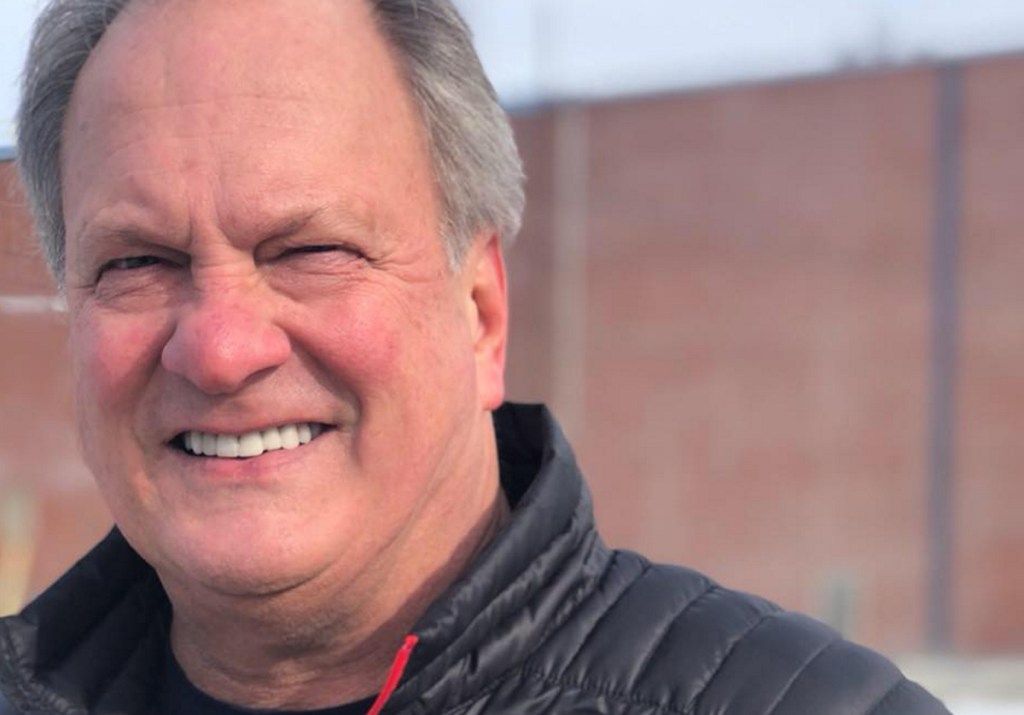
Campaign signs for Max Linn are posted on the side of Maine Mall Road in South Portland this week. His signs have also sprouted in Dover, N.H., where officials want them removed.
AUGUSTA — A Bar Harbor businessman who failed to qualify for Maine’s Republican primary ballot in June is getting flak for illegally placing his U.S. Senate campaign signs in neighboring New Hampshire.
City offices in Dover, New Hampshire, received a handful of complaints about campaign signs for Max Linn popping up at busy intersections and in rights-of-way miles from the Maine border. A Dover official said there are several problems with those signs: Not only is Linn not a candidate in New Hampshire elections, the signs’ placement also violates local and state laws.
“I am going to call and let them know that the signs are not permitted by local ordinance or state law, and if they are not removed within 24 hours, we will remove them,” said Elena Piekut, assistant city planner and zoning administrator for Dover, who contacted the Portland Press Herald on Thursday with a request for Linn’s phone number.
This is just the latest bizarre twist in a campaign that’s been marred by fraudulent and dead-voter signatures and that isn’t even officially recognized by the candidate’s own party.
‘TRUMP STRONG CANDIDATE’
On April 25, Secretary of State Matt Dunlap declared that Linn – a financial planner from Bar Harbor – had fallen 10 signatures short of qualifying for the Republican primary. The campaign of Linn’s would-be primary opponent, Republican state Sen. Eric Brakey of Auburn, had identified numerous instances of petition signatures from deceased voters as well as others that they said appear to have been forged.
Linn appealed the decision even though his own attorney acknowledged during court hearings that “there is no question that there was fraud” during the petition process. Both a District Court judge and Maine’s Supreme Judicial Court upheld Dunlap’s decision invalidating dozens of signatures and, thereby, keeping Linn off the ballot – at least officially.
But because the ballots had already been printed, Republican voters will still see Linn’s name on the ballot on June 12. And this week, Linn’s signs, which are topped with a “Trump strong” message, began popping up throughout southern and central Maine – and, apparently, New Hampshire – even though Dunlap’s office said any votes for the candidate “will be counted as blanks.”
Linn’s campaign spokesman didn’t return a call for comment Thursday, nor did he return previous calls from the Portland Press Herald earlier this week. Linn’s Twitter feed, however, was still boasting about the campaign.
“The outpouring of support from across the State has truly been humbling,” Linn tweeted Thursday afternoon. “Clearly Maine GOP voters want a high energy, Trump Strong candidate!”
On Tuesday, after Linn’s signs began appearing around the state, a Maine Republican Party official said Linn’s status as a candidate had not changed.
“Max Linn has the right to spend his money saying whatever he wishes; that is his choice,” Maine Republican Party Executive Director Jason Savage said. “It does not change the status of the ballot according to the secretary of state and the courts. The Maine GOP recognizes that Sen. Eric Brakey is the Republican candidate who will challenge Angus King in this election.”
‘THERE ARE QUITE A FEW’ SIGNS
King, an independent first elected to the Senate in 2012, officially launched his re-election campaign Thursday during an event in Brunswick. In addition to Brakey, King is expected to face Democrat Zak Ringelstein during the November general election.
Back in New Hampshire, Piekut said she first noticed Linn signs in Dover on Tuesday. New Hampshire law and city ordinances prohibit placement of political signs on public property or in the highway right-of-way without the consent of the property owner. If the city removes the signs, Piekut said, the Linn campaign can come retrieve them but will have to pay a $50 fee for each sign.
“There are quite a few,” Piekut said.
Linn’s campaigning in Maine does not appear to violate any of the state’s election laws even though he is not an official candidate on the June 12 ballot. Campaign signs can be posted temporarily along state highways as long as they are at least 30 feet apart, according to a spokesman from the Maine Department of Transportation.
Kevin Miller can be contacted at 791-6312 or at:
Twitter: KevinMillerPPH
Send questions/comments to the editors.




Comments are no longer available on this story